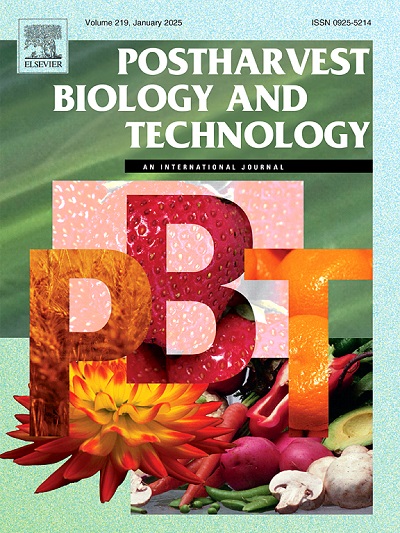Transcriptomics revealed terpinen-4-ol mediated sucrose metabolism and delayed cell wall degradation to maintain blueberry quality
IF 6.4
1区 农林科学
Q1 AGRONOMY
引用次数: 0
Abstract
Fumigation with terpinen-4-ol (4OL) could enhance blueberry quality during postharvest storage in advance study. This work investigated the response of blueberry fruits to 4OL treatment based on transcriptomics. VcSPS2 was noticed not only by significant up-regulation but also due to its relation to sucrose metabolic pathways. Following this clue, the enzymes and genes related to sucrose metabolism pathway were tested on blueberry fruits after 4OL fumigation. The result showed that sucrose content 28 % improved, the sucrose synthesis genes expression up-regulated and enzymes activity increased, the sucrose degradation genes expression down-regulated and enzymes activity suppressed. Meanwhile, VcGLU3 associated with cell wall degradation was observed significantly down-regulated in transcriptomics. Moreover, the enzymes and genes related to cell wall degradation were verified and blueberry firmness were checked. The result indicated that firmness maintained well and the cell wall degradation genes expression down-regulated and enzymes activity suppressed. It indicated that 4OL could be a novel preservative in quality enhancement and retardation blueberry postharvest softening.
转录组学揭示了萜品烯-4-醇介导的蔗糖代谢和细胞壁降解延迟,以保持蓝莓的品质
在预先研究中,用特平宁-4-醇(4OL)熏蒸可提高蓝莓在采后贮藏期间的品质。这项工作基于转录组学研究了蓝莓果实对 4OL 处理的反应。VcSPS2不仅因其显著上调而受到关注,还因其与蔗糖代谢途径有关。根据这一线索,对 4OL 熏蒸后蓝莓果实上与蔗糖代谢途径相关的酶和基因进行了检测。结果表明,蔗糖含量提高了 28%,蔗糖合成基因表达上调,酶活性提高,蔗糖降解基因表达下调,酶活性受到抑制。同时,在转录组学中观察到与细胞壁降解相关的 VcGLU3 明显下调。此外,还验证了与细胞壁降解相关的酶和基因,并检测了蓝莓的坚实度。结果表明,蓝莓果实硬度保持良好,细胞壁降解基因表达下调,酶活性受到抑制。这表明 4OL 可作为一种新型防腐剂,用于提高蓝莓的品质和延缓采后软化。
本文章由计算机程序翻译,如有差异,请以英文原文为准。
求助全文
约1分钟内获得全文
求助全文
来源期刊

Postharvest Biology and Technology
农林科学-农艺学
CiteScore
12.00
自引率
11.40%
发文量
309
审稿时长
38 days
期刊介绍:
The journal is devoted exclusively to the publication of original papers, review articles and frontiers articles on biological and technological postharvest research. This includes the areas of postharvest storage, treatments and underpinning mechanisms, quality evaluation, packaging, handling and distribution of fresh horticultural crops including fruit, vegetables, flowers and nuts, but excluding grains, seeds and forages.
Papers reporting novel insights from fundamental and interdisciplinary research will be particularly encouraged. These disciplines include systems biology, bioinformatics, entomology, plant physiology, plant pathology, (bio)chemistry, engineering, modelling, and technologies for nondestructive testing.
Manuscripts on fresh food crops that will be further processed after postharvest storage, or on food processes beyond refrigeration, packaging and minimal processing will not be considered.
 求助内容:
求助内容: 应助结果提醒方式:
应助结果提醒方式:


